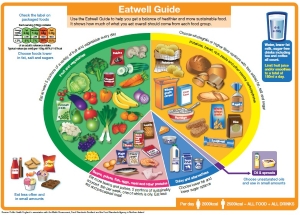This month our Wellbeing focus is Know Your Numbers.  During September we will be sharing information and resources about blood pressure, cholesterol, balanced nutrition, and alcohol.
During September we will be sharing information and resources about blood pressure, cholesterol, balanced nutrition, and alcohol.
This week our focus is Balanced Nutrition.
According to the latest National Diet and Nutrition Survey, only one in five adults in the UK eat their five A Day of fruit and vegetables. This is a concern, as fruit and vegetables are a good source of essential vitamins, minerals, and fibre. The survey also found that the average adult in the UK consumes too much saturated fat, salt, and sugar. This can increase the risk of developing chronic diseases such as heart disease, stroke, and type 2 diabetes.
Eating a balanced diet is essential for maintaining good health and reducing the risk of developing chronic diseases. By following the tips below, you can make sure you Know Your Numbers and that you are getting all the nutrients your body needs in the right amounts.
A balanced diet is one that provides all the nutrients your body needs in the right amounts to function properly and stay healthy. This includes essential nutrients such as protein, carbohydrates, fats, vitamins, and minerals.
The UK government’s Eatwell Guide provides a visual representation of what a balanced diet should look like. It shows that a healthy diet should be made up of a variety of foods from all five food groups:
- Fruit and vegetables: Aim to eat at least five portions of a variety of fruit and vegetables every day. Find out what counts as your five a day here.
- Starchy foods: These foods should make up just over a third of your diet. Choose wholegrain varieties whenever possible, such as wholemeal bread, brown rice, and oats.
- Protein foods: Protein is essential for building and repairing muscles. Good sources of protein include meat, fish, eggs, dairy products, pulses, and nuts.
- Dairy foods: Dairy foods are a good source of calcium, which is essential for strong bones and teeth. Aim to eat at least three portions of dairy foods every day.
- Oils and spreads: Choose unsaturated oils and spreads, such as olive oil, rapeseed oil, and avocado spread, as these are healthier than saturated fats.
How much should we be eating?
The amount of food you need to eat will vary depending on your age, sex, activity level, and other factors. However, there are some general guidelines that you can follow:
- Adults should aim to eat 2,000-2,500 calories per day for men and 1,600-2,000 calories per day for women.
- Children’s calorie needs vary depending on their age and activity level. However, as a general guide, 5-11 year olds should aim to eat 1,600-2,500 calories per day and 12-18 year olds should aim to eat 2,000-3,200 calories per day.
What types of food should we be eating?
In addition to eating a variety of foods from all five food groups, it is also important to choose the right types of foods within each food group. For example, it is better to choose wholegrain starchy foods over refined starchy foods, and lean protein foods over fatty protein foods.
Here are some specific tips for choosing healthy foods within each food group:
- Fruit and vegetables: Choose a variety of fruit and vegetables from all different colours. Some good options include berries, apples, bananas, pears, oranges, grapefruit, tomatoes, carrots, broccoli, spinach, and kale.
- Starchy foods: Choose wholegrain varieties whenever possible, such as wholemeal bread, brown rice, and oats. Other good options include potatoes, sweet potatoes, and corn.
- Protein foods: Choose lean protein foods, such as chicken, fish, beans, lentils, and tofu. Avoid processed meats, such as bacon, sausages, and salami, as these are high in saturated fat and salt.
- Dairy foods: Choose lower fat and lower sugar dairy products, such as semi-skimmed or skimmed milk, reduced-fat cheese, and plain low-fat yoghurt.
- Oils and spreads: Choose unsaturated oils and spreads, such as olive oil, rapeseed oil, and avocado spread. Avoid saturated fats, such as butter and coconut oil.
Here are some additional tips for eating a balanced diet:
- Plan your meals ahead of time. This will help you to make sure that you are eating a variety of foods from all five food groups.
- Cook at home more often. This gives you more control over the ingredients in your food and allows you to choose healthier options.
- Be mindful of your portion sizes. It is easy to overeat, especially when eating out or when eating processed foods.
- Limit sugary drinks and snacks. Sugary drinks and snacks are high in calories and low in nutrients.
- Drink plenty of water. Aim to drink at least six glasses per day.
We have shared the Government’s Eatwell Guide here and you can also find further online information about Balanced Nutrition here:
- NHS: https://www.nhs.uk/live-well/eat-well/how-to-eat-a-balanced-diet/eating-a-balanced-diet/
- NHS: https://www.nhs.uk/live-well/eat-well/5-a-day/5-a-day-what-counts/
- British Heart Foundation: https://www.bhf.org.uk/informationsupport/heart-matters-magazine/nutrition
